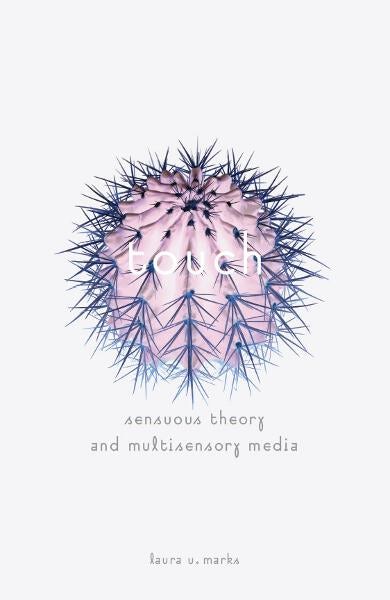Laura U. Marks: Touch: Sensuous Theory and Multisensory Media (2002)
Filed under book | Tags: · ascii, experimental film, feminism, film, net art, performance art, pornography, video art, voyeurism

“In Touch, Laura U. Marks develops a critical approach more tactile than visual, an intensely physical and sensuous engagement with works of media art that enriches our understanding and experience of these works and of art itself.
These critical, theoretical, and personal essays serve as a guide to developments in nonmainstream media art during the past ten years-sexual representation debates, documentary ethics, the shift from analog to digital media, a new social obsession with smell. Marks takes up well-known artists like experimental filmmaker Ken Jacobs and mysterious animators the Brothers Quay, and introduces groundbreaking, lesser-known film, video, and digital artists.
From this emerges a materialist theory-an embodied, erotic relationship to art and to the world. Marks’s approach leads to an appreciation of the works’ mortal bodies: film’s volatile emulsion, video’s fragile magnetic base, crash-prone Net art; it also offers a productive alternative to the popular understanding of digital media as “virtual” and immaterial. Weaving a continuous fabric from philosophy, fiction, science, dreams, and intimate experience, Touch opens a new world of art media to readers.”
Publisher University of Minnesota Press, Oct 2002
ISBN 0816638896, 9780816638895
288 pages
PDF (updated on 2024-11-26)
Comment (0)Matteo Pasquinelli: Animal Spirits: A Bestiary of the Commons (2008)
Filed under book | Tags: · activism, commons, filesharing, free culture, media culture, pornography

“After a decade of digital fetishism, the spectres of the financial and energy crisis have also affected new media culture and brought into question the autonomy of networks. Yet activism and the art world still celebrate Creative Commons and the ‘creative cities’ as the new ideals for the Internet generation. Unmasking the animal spirits of the commons, Matteo Pasquinelli identifies the key social conflicts and business models at work behind the rhetoric of Free Culture. The corporate parasite infiltrating file-sharing networks, the hydra of gentrification in ‘creative cities’ such as Berlin and the bicephalous nature of the Internet with its pornographic underworld are three untold dimensions of contemporary ‘politics of the common’. Against the latent puritanism of authors like Baudrillard and Žižek, constantly quoted by both artists and activists, Animal Spirits draws a conceptual ‘book of beasts’. In a world system shaped by a turbulent stock market, Pasquinelli unleashes a politically incorrect grammar for the coming generation of the new commons.”
Published by NAi Publishers, Rotterdam / Institute of Network Cultures, Amsterdam, December 2008.
ISBN 9056626639, 9789056626631
240 pages
Reviews: Luciana Parisi (Mute, 2009), Willem van Weelden (Open, 2009), Jussi Parikka (Leonardo, 2009), McKenzie Wark (Public Seminar, 2015).
PDF (updated on 2012-7-15)
Comment (0)Katrien Jacobs, Marije Janssen, Matteo Pasquinelli (eds.): C’Lick Me: A Netporn Studies Reader (2007)
Filed under book | Tags: · internet, pornography

C’Lick Me: A Netporn Studies Reader is an anthology that collects the best material from two years of debate from The Art and Politics of Netporn 2005 conference to the 2007 C’Lick Me festival. The C’Lick Me reader opens the field of ‘Internet pornology’. Based on non-conventional approaches and mixing academics, artists and activists, it reclaims a critical post-enthusiastic, post-censorship perspective on netporn, a dark field that has been dominated thus far by dodgy commerce and filtering.
The C’Lick Me reader covers the rise of the netporn society from the Usenet underground to the blogosphere, analyses economic data and search engine traffic, compares sex work with the work of fantasy, disability and accessibility. The reader also expands the notion of digital desire beyond the predictable boundaries of the porn debate and depicts a broader libidinal spectrum ranging from fetish subcultures to digital alienation, from code pornography to war pornography. C’Lick Me concludes by re-contextualising queer discourse into a post-porn scenario.
Publisher Institute of Network Cultures, Amsterdam, 2007
ISBN 9789078146032

